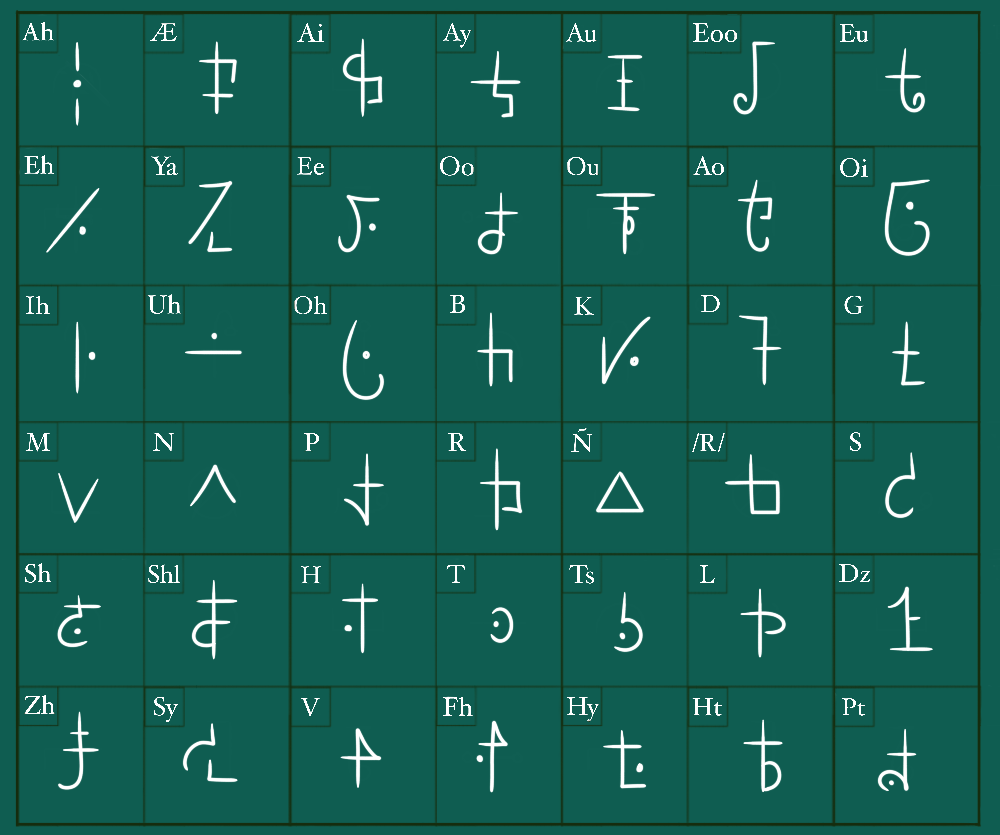Arbur
Arbur is an alphabetic language, written right to left, verb-subject-object. It has the largest alphabet of any spoken language, with 42 letters. It doesn't use diacritics or articles. Particles are used to indicate possession, location, time, and direction, as well as as vocatives, pragmatics, formalities (or insults), connectives, and conjunctions.
Speaking in Arbur places much emphasis on formality and hierarchy, built into the language mostly via particle use. There are particles whose sole purpose is to indicate the degree of respect, familiarity, status, or disrespect the speaker intends. These are usually placed at the beginning or end of sentences, but may also go after certain verbs, nouns, or pronouns. Particles cannot be placed adjacent to one another with the sole exception of formality particles, which may be followed by another, grammatical, particle.
Speaking without formality particles is very familiar, usually percieved as childlike (children are usually not expected to use formality particles, incorporating them into their speech slowly as they age). Adults usually speak to children without formality particles, but to speak to other adults without them is often seen as either immature (of the speaker) or patronizing (of the listener), or both. Adults instead use familiar particles when speaking with family and friends, polite but equal particles when speaking with strangers or acquaintances, respectful particles when speaking with superiors or the elderly, and different, higher-status respectful particles when speaking with very important people such as governmental or religious leaders. There are also particles that indicate disgust, disrespect, or otherwise insulting sentiments that are obviously rarely used in polite society.
There are two major dialects of Arbur: split by the geographic boundary of the rift valley seperating its speakers into two halves1. They are, for the most part, mutually intelligible, but at the peak of satyrs' activity (economically and demographically), they had drifted to the point that many diplomats, merchants, and travelers from opposite sides of the rift would have to converse in Solan, even if both were satyrs.
The basin dialect, or Central Arbur, is spoken west of the rift, particularly in Yañaiveut before the cataclysm. It is less formal than Eastern Arbur- casual use of familiar particles is more socially acceptable. It incorporates some Paitarō grammatical structures and words, particularly in verb conjugations that do not exist in Eastern Arbur. Phonetically, it is most obviously characterized by the plosive g adopting a more frictive ɣ. Some words with this alteration take on new meanings compared to their plosive counterparts.
The eastern dialect has more speakers post-cataclysm, as the Yañaiveut prefecture was destroyed and much of satyr's cities in the central basin were abandoned after the cataclysm. It has maintained its formality from pre-cataclysm times and adopted some modified Homonic particles for other purposes such as action that were not native to Arbur. Eastern Arbur is closer to "traditional" or "standard" Arbur.

"Shleya bouk dzayñen aotal voh."
"This is an example sentence."
'Voh' in this sentence is an example of a particle that expresses certainty. It is typically used in either academic or otherwise professional contexts in which the information being conveyed is A: unknown to the listener, B: unquestionable fact, or both. It may also be used to show confidance in one's opinion, expressing that the speaker believes whatever they are saying to be as unquestionable as a proven fact.